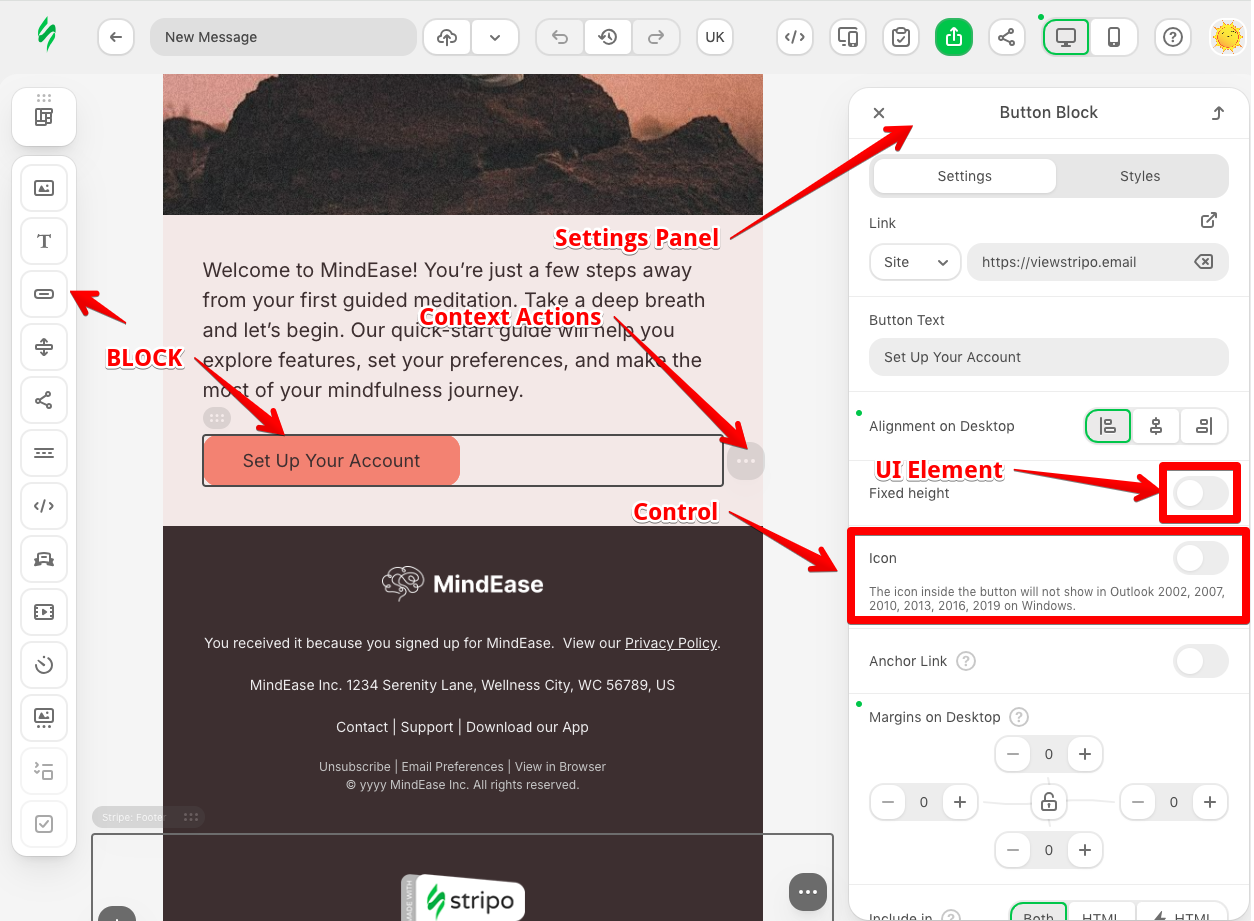Appearance
Settings Panel
Overview

The Settings Panel component is the central hub for block configuration in the Stripo Email Editor. It provides a structured interface where users can modify block properties, adjust styling, and configure behavior. Through the SettingsPanelRegistry, developers can customize which controls appear for specific blocks, organize controls into logical tabs, and create intuitive configuration experiences that match their business requirements.
Purpose and Core Concepts
What is a Settings Panel?
The Settings Panel in the Stripo Extensions SDK is a customizable configuration interface that:
- Is displayed when users select blocks in the editor
- Organizes controls into logical tabs (Settings, Styles, Data, etc.)
- Can be customized per block type — both built-in and custom
- Maintains consistency across the editor while allowing deep customization
- Adapts to different block types automatically
Settings Panel Registry
The SettingsPanelRegistry is the central mechanism for customizing settings panels:
- Define which controls appear for specific blocks
- Organize controls into tabs with custom labels
- Add, remove, or reorder controls
- Extend built-in blocks with custom controls
- Create completely custom settings interfaces
Settings Panel Tabs
Controls are organized into tabs using SettingsPanelTab instances:
- Each tab has a unique identifier and label
- Controls within tabs are ordered sequentially
- Standard tabs (Settings, Styles, Data) provide consistency
- Custom tabs can be created for specialized workflows
Key Features and Capabilities
1. Per-Block Customization
Settings panels can be tailored to specific block types:
- Different controls for text blocks vs. image blocks
- Custom configurations for extension blocks
- Complete control over built-in block settings
2. Tab Organization
Controls are organized into intuitive tab groups:
- Standard tabs (
SettingsTab.SETTINGS,SettingsTab.STYLES,SettingsTab.DATA) - Custom tabs with localized labels
3. Dynamic Control Management
Fine-grained control over which controls appear:
- Add custom controls to existing tabs
- Remove unwanted built-in controls
- Reorder controls within tabs
- Conditional control visibility based on state
4. Localization Support
Full internationalization capabilities:
- Translate tab labels using the
api.translate()method - Support for all editor languages
- Fallback to default labels when translations are missing
Creating Custom Settings Panels
Basic Configuration
To customize a settings panel:
- Create a class that extends
SettingsPanelRegistry. - Implement the
registerBlockControls()method in your class:- Use the block ID as the key in the
controlsmap. - Add one or more
SettingsPanelTabobjects to define the tabs you want. - For each
SettingsPanelTab, specify a tab identifier (name) and an ordered list of control IDs to include in that tab.
- Use the block ID as the key in the
- Register your registry with the
ExtensionBuilder.
Minimal configuration for a custom block:
javascript
import {SettingsPanelRegistry, SettingsPanelTab, SettingsTab, ExtensionBuilder} from '@stripoinc/ui-editor-extensions';
class CustomBlockSettingsRegistry extends SettingsPanelRegistry {
registerBlockControls(controls) {
// Add settings for your custom block
controls['my-custom-block'] = [
new SettingsPanelTab(
SettingsTab.SETTINGS,
[
'background-color-control',
'padding-control'
])
];
}
}
export default new ExtensionBuilder()
.withSettingsPanelRegistry(CustomBlockSettingsRegistry)
.build();Note: If all controls within a Settings Panel Tab are hidden, the tab itself will automatically be hidden as well.
For a comprehensive guide to configuration scenarios and advanced use cases, refer to the Configure the Settings Panel tutorial.